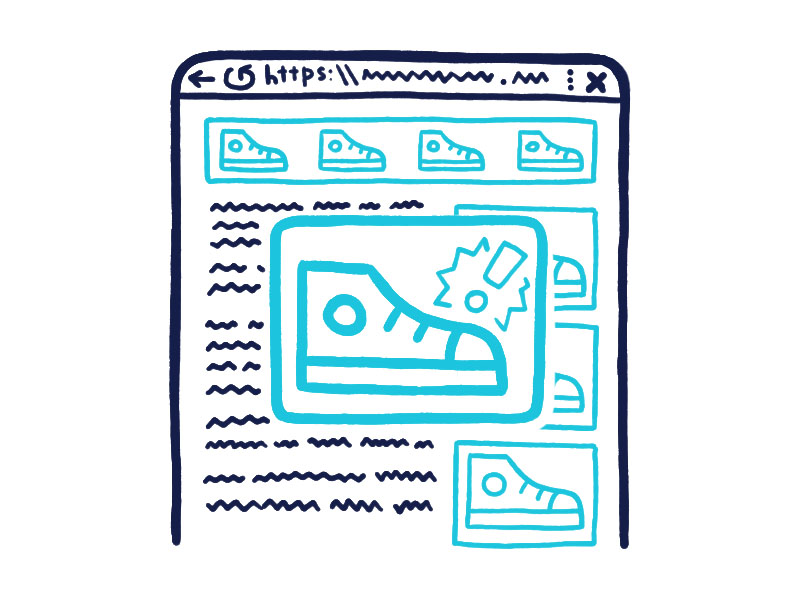So how exactly DO those ads know so much about you? We'll get into it in this video

Transcript
Davis: Hey David! Welcome back. Let’s dive right into it. How do ads track us on the internet?
David: There are so, so, so many ways this tracking happens, and each way has its own special mix of techniques and algorithms. Generally, when you visit a website or use an app that has ads in it, those ads can infer your interest, sometimes possible demographic data, and more based on the content of that page and what is known about its other visitors. A or app ad identifier then correlates that visit with your visits on other websites that the same ad network has their ads in.
Davis: Gotcha. You mentioned cookies just now. We’re recording this in February 2022, and there’s a lot of news lately about how Apple and Google, especially, are looking at ditching the cookie, but that’s not coming yet. So why don’t you please share: exactly what is a cookie?
Cookies allow a website to remember your interactions with them so that it doesn’t treat every page visit as if it’s by a new visitor.
David: Yeah, so cookies have been around since the ’90s. They’re kind of a tried entry way for a website to keep track of who you are when you visit a site. And the reason for that is, say you’re shopping for books online, for example. Rather than having the website repeatedly ask you which books you want to buy every time you visit a different page in a site, it can remember it as you browse. And this is what makes online shopping carts work. For example, cookies allow a website to remember your interactions with them so that it doesn’t treat every page visit as if it’s by a new visitor.
Davis: Thanks for diving into that. What other tools are being used to track our data?
David: So, over the years ads have evolved more sophisticated ways of keeping track of who you are. Smartphone apps may leverage an advertiser ID, which is different from a cookie, which allows ads to track your usage of an app to some degree. Since cookies are designed for web browsers, you know, your Chrome, Firefox, et cetera. And apps are not websites. Advertising IDs are used by ad networks to identify people instead.
Apps have the ability to track your precise location if you allow them the permission when prompted for that.
Davis: I read a whole series of articles a year ago about how location settings literally track us around the world. Is there any truth to that? And how does that work?
David: So apps have the ability to track your precise location if you allow them the permission when prompted for that. Sometimes that’s just for when you use the app. Sometimes, always. Not all apps are going to be up front about what they do with the data they collect, including precise location. So if an app is asking for location access, it’s super important to at least skim through the app’s privacy policy to see what they’re allowed to do with the data they collect about you.
Davis: Right, so there’s a whole web happening here behind the scenes. And so that leads me to wonder who does this benefit, exactly, if it’s not the web users who is actually gaining from the system?
David: Whether it’s somebody’s best interest I think depends on the company behind the ad. Companies trying to sell fancy cookware to people who like photos of cool architecture on Instagram — which would be me — have a rough approximation of who you are based on the amount of data they’ve collected on you from visits to other sites and other app usage.
A company can make a nice profit on an overpriced skillet by only placing those ads in front of just the people most likely to buy it. Each ad a company runs costs a certain amount, so any ad that doesn’t lead to a sell is a loss. And companies want sales not losses. So targeted ads are an attractive proposition, and, you know, have been kind of the holy grail of marketing for a long time.
Targeted ads are an attractive proposition and have been kind of the holy grail of marketing for a long time.
It turns out, though, that not all companies are totally ethical — I know, it’s a shock. When ad networks become a way for companies to know way too much about their viewers, it can lead to potential for exploitative industries to pitch their products in front of more vulnerable populations. The data that ads collect about you may also end up being repackaged and sold. The companies that specialize in trying to connect the dots between, you know, online ad viewers and real world people with addresses and phone numbers and lists family names — it can get very creepy very quickly.
Davis: Yeah, for sure. It gets real dark real fast. So before I let you go, I wonder if we can find room for optimism. Are there any circumstances in which this sort of tracking is beneficial to web users?
David: Ads are generally seen as [an] annoying kind of a blight that interrupts your attention when you’re trying to look at other content. However, if you experience the web, or apps with only ads that you happen to enjoy, that’s technically, you know, in theory a win-win. I don’t mind, you know, beautifully photographed cookware ads, since I go to places like Instagram to look at that sort of thing anyway. If an ad network knows enough to know my tastes, I’m more likely to just see ads that I like, and that makes the internet technically, in theory, slightly less annoying.
Davis: Yeah, slightly, but maybe only slightly. If you do find these things annoying, there’s hope for you yet. Our next episode is going to be on preventing ads from tracking us around so tune in for that.
Further Reading
What are Cookies?
An overview of how cookies work and how to stay safe onlineThe Inventor Of The Digital Cookie Has Some Regrets
An interview with Lou Montulli, inventor of the web cookie.The Reasoning Behind Web Cookies
A reflection on the development of the cookie, by their creator.One Nation, Tracked
An interactive feature that investigates the smartphone tracking industry.How to Disable Ad ID Tracking on iOS and Android, and Why You Should Do It Now
This article explains the history of device ad identifiers and how they have enabled persistent tracking, identification, and other privacy invasions.Digital Inclusion and Data Profiling
This paper examines specific examples of commercial data profiling against a longer history of low–tech data profiling of chronically underserved communities.
Relevant Terms
Ad Identifier
An ad identifier enables most third-party tracking on mobile devices. Per this article from EFF, "disabling it will make it substantially harder for advertisers and data brokers to track and profile you, and will limit the amount of your personal information up for sale."
Contributor Bios
- Davis Erin Anderson is Director of Programs and Partnerships at METRO Library Council.
- David Huerta is a Digital Security Trainer at Freedom of the Press Foundation, where he trains journalists in privacy-enhancing technology to empower a free press. He’s taught hundreds of trainings across the world and has previously organized the digital security track at the National Association of Hispanic Journalists (NAHJ) conference. He’s also spoken on the subject of usable privacy technology at DEF CON, Radical Networks, Rightscon, Facets, Allied Media Conference and anywhere the words "use PGP" summon him to a stump speech.
- This project is funded by the Mayor’s Office of the Chief Technology Officer, and produced in collaboration with Brooklyn Public Library, The New York Public Library, and Queens Public Library.


